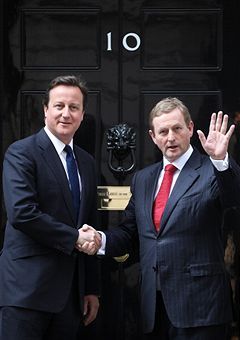 All eyes were on Greece at last week’s crisis summit in Brussels, but other
indebted countries took advantage of Angela Merkel’s generous mood. In line with concessions made to Greece, the Irish secured a substantial cut in interest repayments on its bailout loan: the rate has fallen from 6 per cent to somewhere
between 3.5 per cent and 4 per cent, and the loan period has been extended from seven to 15 years. This was a long-term goal of Enda Kenny’s government and the renegotiations are
being heralded as a major victory.
All eyes were on Greece at last week’s crisis summit in Brussels, but other
indebted countries took advantage of Angela Merkel’s generous mood. In line with concessions made to Greece, the Irish secured a substantial cut in interest repayments on its bailout loan: the rate has fallen from 6 per cent to somewhere
between 3.5 per cent and 4 per cent, and the loan period has been extended from seven to 15 years. This was a long-term goal of Enda Kenny’s government and the renegotiations are
being heralded as a major victory.
But the matter does not end there. When Kenny first tried to renegotiate the terms of its Eurozone loan in late February, I called the Irish Treasury to ask if Ireland was seeking to lower the interest rate on its bi-lateral loan with Britain. The official I spoke to said that it wasn’t because any concession made by the Eurozone would necessarily alter the terms of the bi-lateral loan. I was somewhat taken aback by this, as was the UK Treasury when I asked them to respond. Eventually, the British government rejected Ireland’s position outright, although it conceded that it might voluntarily change the terms according to Ireland’s ability to pay (a provision that exists in the original parliamentary Act).
The story went cold because Kenny failed to achieve his objective, and he did not feel the need to discuss these matters during his brief visit to Britain in April. But yesterday, Finance Minister Michael Noonan said that the new rates will apply to Ireland’s bilateral loans with Britain, Denmark and Sweden.
The UK-Ireland loan is a complicated document, but the Irish government’s case apparently rests on the general covenants defining the terms of the loan: specifically this phrase:
The pari passu arrangement might be interpreted to mean that changes to the senior mechanism affect the junior facilities to some extent. And that was the Treasury Select Committee’s understanding when it scrutinised the bill last December, according to two of its members at any rate. If that is what pari passu means in this context, then I suspect that George Osborne will have a job in pacifying the Tory right, among others. Politically, the bi-lateral loan was packaged as a short-term investment over 7 and a half years; there will be those who won’t take kindly to the terms being changed.‘(a) pari passu ranking of obligations under the credit agreement with all other unsecured, unsubordinated obligations (recognising the seniority of the support facilities provided by the IMF and European Financial Stability Mechanism).’
UPDATE: It has been pointed out below that George Osborne has actually already signalled his intention to cut the interest rate on Britain’s bilateral loan to Ireland from 5.8 per cent to 3.5 per cent, following the Eurozone’s decision last week. Apologies for the confusion; I have edited the post above to accomodate this fact.






Comments